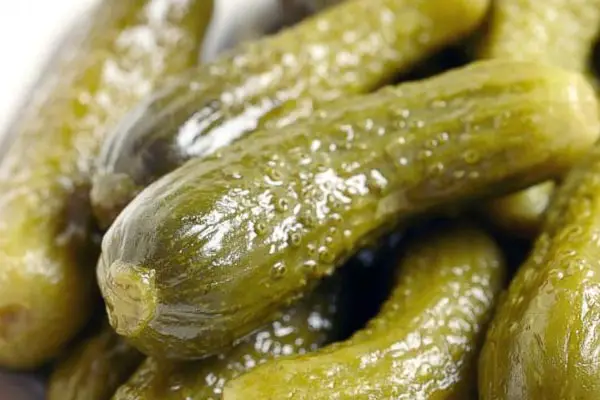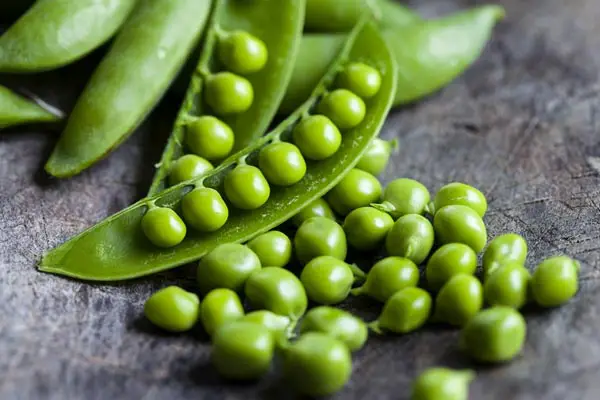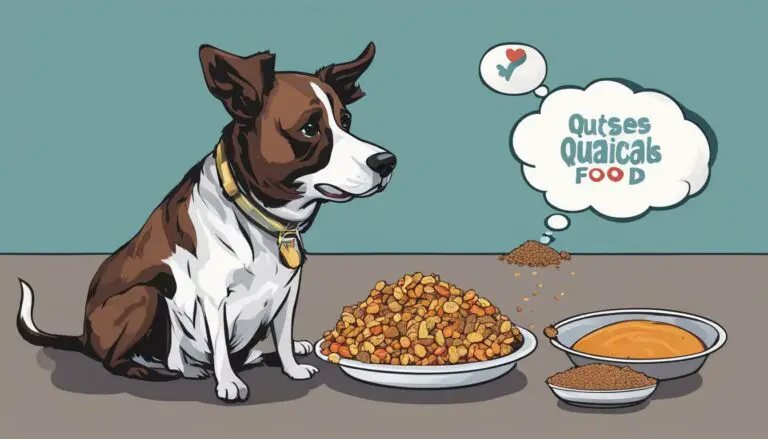Dogs and Pickles: Is There a Problem Here?
Introduction
Dogs are pretty intelligent creatures. Anyone who owns a pooch knows this to be true. However, not every dog knows what foods will be harmful to her to eat.
For this reason, your dog may want to share with you pickles or pickled items. The question is, should you allow your pooch to share your pickle with you?
You will see that the answer to this question basically is negative. However, if your dog really wants a taste of your pickle, then there is nothing really wrong with it in general.
The truth is that there are other healthy alternatives for snacks for your pup. This article will give a review of some of these snacks.
You should know, however, that the commercial dog food that you feed your dog is a complete diet for them. The only reason that you need to give your dog snacks is that a little variety is a good thing for their morale.
Can Dogs Eat Pickles?
While a little bit of pickle will probably not harm your dog, it is not a good idea to feed your dog pickles in large amounts.
The composition of pickles is basically vegetables that are soaked in a saline solution that consists of vinegar, salt, and assorted spices.
Pickles have some variability in their composition. Their potential toxicity depends a lot on the mix of ingredients used during their cooking process.
You should avoid giving pickles to your dog that is heavily spiced. They may consist of seasonings that include substances that are toxic to your canine friend. This might give them an upset stomach.
Pickles that are cooked with onions or pickled onions can be a real problem for dogs. They contain a high content of thiosulphate. This substance can trigger Heinz body anemia.
This is also known as hemolytic anemia. This is a rather serious condition. It can affect the red blood cells of the dog, causing them to burst.
Severe cases of this condition may necessitate a blood transfusion. The condition can sometimes be fatal.
The symptoms of this condition include the passing of dark-colored urine, vomiting, diarrhea, and breathing problems. You must take your pet to the veterinarian if she has any of these symptoms.
The other potential problem with pickles is the quantity of salt that they contain. You might notice that your pet’s feed contains almost 100% of its daily requirements.
Too much sodium won’t hurt your pet if she gets too much on occasion. However, if the salt level in their system gets too high, it can result in a condition called hypernatremia.
The symptoms of this condition include increased thirst, vomiting, diarrhea, confusion, and seizures. You must take your pet to the vet if she has any of these symptoms.
Just like with humans, excessive salt can lead to high blood pressure. This, in turn, can result in a heart attack or stroke.
Are Pickles Good For Dogs?
One might think that, since pickles are vegetables, it may be healthy for them to consume them. The reason that this is not so is that the pickling process eliminates many of the nutrients that they possess.
What is true, though, is that pickles are rich in fiber and contain some vitamins and minerals in small quantities.
If a dog is going to eat a pickle, then it is better than they eat an unsweetened and non-spicy one. Also, it should be unsalted.
Can Dogs Eat Dill Pickles?
Dill pickles are not so harmful to your pooch to consume. However, they have little nutritional value and contain too much sodium. If you want to give tiny portions as an occasional treat, then that is fine.
A preferred treat can be the dill itself. This herb is actually helpful for maintaining the digestive system.
Can Dogs Eat Sweet Pickles?
If you have the choice, then feeding sweet pickles to your dog is preferable to feeding them heavily spiced pickles. However, they still contain sodium, so you should only give small amounts to them.
It would actually be a better idea, though, to feed your pet fresh vegetables. You can feed them cucumbers or carrots.
Is Pickle Juice Bad for Your Dog?
Pickle juice can be very bad for your dog. It contains vinegar, spices, and lots of salt. This is not a good mixture for your pet.
However, some people actually recommend pickle juice for dogs who have dehydration. This is because it contains a lot of electrolytes.
The truth is that this is not a good idea, however. A large amount of salt in the juice is simply no good for your dog.
If your dog is suffering from dehydration, then you should consult your veterinarian.
If for some strange reason, you feel compelled to give your pet a pickle, then The Happy Puppy Site recommends that you should wash off the pickle to remove any excess salt that it has on it.
Should You Give Pickles as Treats?
The truth of the matter is that the dog food that you regularly feed your dog is formulated to include everything that your pooch needs for proper nutrition.
The tiny amounts of vitamins and minerals that are contained in pickles simply are of no real benefit to your pet.
Therefore, it is recommended that you not give pickles to your dog unless she is really attracted to the food. If she is really attracted to the food, then you should give her only little pieces of them.
Is It Safe for a Dog to Eat Garlic?
Some varieties of pickles contain garlic or pieces of garlic. Garlic is toxic to dogs if they consume it in certain amounts.
According to the American Kennel Club, research indicates that it is only after consuming about 15 to 30 grams of garlic per kilogram of body weight that there is a real problem.
Can a Dog Eat Pickled Ginger?
Ginger itself is actually healthy for your dog to consume. There are five ways that ginger may help your pet:
1. Nausea
There are many reasons that your dog may end up with nausea. She may get sick or have car sickness. Whatever the reason for nausea, ginger may help. You can give your dog ginger 30 minutes before she gets into the car for nausea.
2. Bloat
Bloat can be a very serious condition of larger breeds. Ginger may help your dog because of its ability to stimulate movement in the stomach and accelerate emptying.
3. Arthritis
Ginger is a natural anti-inflammatory. Therefore, it may offer some relief from inflamed joints.
4. Cancer
Ginger has shown some benefits as a cancer fighter in some studies. Also, since inflammation is key in cancer development, ginger can play a role in staving it off.
5. Heartworm
The positive thing about using ginger to treat heartworm is that you don’t need to use other treatments which may be risky because of the toxicity of their chemicals.
Ginger is best administered to your pet in raw form. You need to take off the skin to expose the yellow part of the root.
Dogs Naturally Magazine says that you should give 1/2 teaspoon for dogs under 35 pounds and 3/4 teaspoon for larger dogs.
You should avoid giving pickled ginger because it has some unnecessary ingredients that are just not helpful for your dog. For instance, it contains sodium. The sodium is not beneficial for your dog.
Can Your Dog Eat Pickled Beets?
The problem with pickled beets is that their pickling involves a significant amount of salt. Beets that aren’t pickled are good for your pet. They provide some vitamins and other healthy things. They also are good for cancer prevention.
Can Your Dog Eat Pickled Herring?
Intrinsically, herring and anchovies are healthy for your dog. They are very rich in omega-3 acids. However, herring or anchovies should be served raw or cooked.
Smoked, pickled, or salted fish contains ingredients that we have mentioned before that may harm your dog.
Can Your Dog Eat Pickled Eggs?
Eggs intrinsically are a healthy thing for dogs to eat. However, if they are pickled, then you have all of the problems mentioned above with regard to all pickled foods.
Therefore, if you are going to treat your dog to a hard-boiled egg every once in a while, then it would be best if it were not pickled.
What Are Healthy Snacks for Dogs?
Thankfully, there are a lot of healthy snack alternatives for your dog. There is no real necessity to feed your dog Pickles.
If your dog does seem to want a piece of your pickle when you are eating one, then you can just substitute another healthy treat that your dog will enjoy.
If your dog is eating a healthy diet, then he most likely won’t get hungry between meals. However, as we know, variety is the spice of life. So, you may want to offer your pet some of the following fresh treats:
The following fresh treats are recommended by The Digest:
Apples
Apples are rich in fiber and vitamins. Also, the fact that they don’t contain much protein and fat makes them an ideal treat for older dogs.
You must remember to take out the seeds and core from the apple when you feed them to your dog. Apple seeds contain cyanide, so your dog should not regularly consume them.
Bananas
Bananas are low in calories, so they are a great snack for dogs. They are also rich in potassium and fiber.
Bananas also don’t contain much cholesterol and sodium. Since they have a lot of sugar, you should serve them to your pup only in moderation.
Blueberries
Blueberries are good for both humans and dogs too. They are packed with antioxidants, fiber, and phytochemicals. These will help prevent and fight disease.
Cantaloupe
A slice of cantaloupe is packed with a lot of healthy nutrients. It is packed with beta-carotene, fiber, folate, niacin, potassium, and vitamins A, B-6, and C. You must be careful to dispose of the seeds and rind. These can result in some stomach distress.
Carrots
Carrots are particularly good for your canine’s teeth. The texture of carrots helps remove harmful plaque and other substances from the surface of the teeth.
Carrots are packed with fiber, beta-carotene, and vitamin A. They also don’t have many calories.
Celery
Celery is both rich in nutrients and low in calories. It has vitamins A, B, and C in it. This vegetable can heighten your dog’s immune system, energy levels, and total health.
Cucumbers
Cucumbers are lacking in fats and oils. This makes them the ideal treat for an overweight dog. They are packed with potassium, copper, magnesium, biotin, and vitamins K, C, and B-1.
Green Beans
These are also great for overweight dogs because they are low in calories. They are a great source of fiber, iron, calcium, folic acid, niacin, and vitamins A, C, and K. They provide your pet with good digestion and a better immune system.
Pears
These fruits contain fiber and vitamins C and K. They help with your dog’s digestion and immune system.
Pumpkin
You should serve the pumpkin raw. Just remember to remove the stems, skins, and seeds. Pumpkin is rich in many nutrients. These include fiber, zinc, potassium, and vitamin A. Pumpkin is also a great remedy for stomach distress.
Red Peppers
Their color is indicative of the great number of nutrients that they contain. Just remember to dispose of the stems and seeds.
Conclusion
The basic takeaway from this article is that pickles and pickled items contain ingredients which are either bad for your dog or are simply empty of nutrients.
To give your pet a little bit of pickle from time to time is not extremely harmful, but you would be better off giving her a fresh treat from the list that was provided.
According to PetMD, it is not a good idea, in general, to feed your dog people food for physical and behavioral reasons.
For more discussion on the types of foods that dogs should not eat, you can see the following YouTube video.






